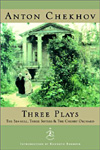
Three Plays: The Sea-Gull, Three Sisters and the Cherry Orchard
By Anton Chekhov
When I was 11 years old, I saw a production of The Cherry Orchard, and I decided that I wanted to be an actress. Masha in The Sea-Gull is an incredible part: She is a funny, frumpy character, but she's also dealing with turbulent emotions. She says she's "in mourning for my life." Someone once said to me that every character in Chekhov's works is a hero, because other people in those predicaments would kill themselves; what's so interesting to me is how his characters constantly try to put words to their feelings. They're falling in love with people, and they don't know why. They're educated, and they're supposed to be in control of their emotions, but they're not. Chekhov's plays aren't on a huge, heightened, Shakespearean level, where people are kings and countries are falling. They are precious and intimate, and I think that's why we keep going back to them.
By Anton Chekhov
When I was 11 years old, I saw a production of The Cherry Orchard, and I decided that I wanted to be an actress. Masha in The Sea-Gull is an incredible part: She is a funny, frumpy character, but she's also dealing with turbulent emotions. She says she's "in mourning for my life." Someone once said to me that every character in Chekhov's works is a hero, because other people in those predicaments would kill themselves; what's so interesting to me is how his characters constantly try to put words to their feelings. They're falling in love with people, and they don't know why. They're educated, and they're supposed to be in control of their emotions, but they're not. Chekhov's plays aren't on a huge, heightened, Shakespearean level, where people are kings and countries are falling. They are precious and intimate, and I think that's why we keep going back to them.
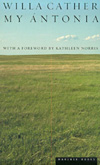
My Antonia
By Willa Cather
My father gave me a copy of My Antonia, and I found the spareness of Cather's writing astonishing. The way she expresses longing and the way the landscape becomes a part of that longing affected me so much. Years later, when I was working in Nebraska, I took a day to drive up to one of Willa Cather's homesteads in Red Cloud. It was a simple house in the middle of this solid Nebraskan town, and I saw how her work is a perfect expression of that part of the country and the people who've carved out a life there.
By Willa Cather
My father gave me a copy of My Antonia, and I found the spareness of Cather's writing astonishing. The way she expresses longing and the way the landscape becomes a part of that longing affected me so much. Years later, when I was working in Nebraska, I took a day to drive up to one of Willa Cather's homesteads in Red Cloud. It was a simple house in the middle of this solid Nebraskan town, and I saw how her work is a perfect expression of that part of the country and the people who've carved out a life there.
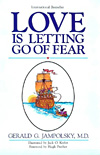
Love is Letting Go of Fear
By Gerald G. Jampolsky, M.D.
A therapist told me about this book. Eight or nine years ago, when I was living in New York, I started flying out to L.A. for auditions. I was filled with fear. I had been part of a closely knit theater company, Cornerstone, and while I was ready to pursue other things, the idea of putting myself out there in a new area was horrifying. The book taught me that life is about either loving or fearing. Underneath hatred, aggression, negativity—it's all fear. If you can't admit that you're scared, you can't let go of those emotions and you can't move forward. This simple little life-affirming book—one that I literally clutched in my sweaty palms in L.A.—has provided me with a lot of comfort.
By Gerald G. Jampolsky, M.D.
A therapist told me about this book. Eight or nine years ago, when I was living in New York, I started flying out to L.A. for auditions. I was filled with fear. I had been part of a closely knit theater company, Cornerstone, and while I was ready to pursue other things, the idea of putting myself out there in a new area was horrifying. The book taught me that life is about either loving or fearing. Underneath hatred, aggression, negativity—it's all fear. If you can't admit that you're scared, you can't let go of those emotions and you can't move forward. This simple little life-affirming book—one that I literally clutched in my sweaty palms in L.A.—has provided me with a lot of comfort.
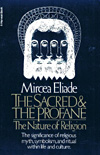
The Sacred and the Profane
By Mircea Eliade
I read this book in one of my college classes. Eliade explains what lies at the center of certain faiths, religions and spiritual systems. He talks about how each faith defines a "center of the world" and how most practitioners want to be as close as possible to that sacred site. Certainly we're watching that in the Middle East. Some of us ask, "Why are people squabbling over that piece of land?" According to Eliade, everything emanates from the believers being able to stand on that land; if they can't do that, chaos ensues. I grew up in a Congregational Church and have a very loose sense of the divine, but one night I was going back over the high points of my life, the times when I felt as if the little shell I'd developed had cracked open: the birth of my daughter, when I fell in love with my husband, when I worked with friends to start a theater company. Eliade talks about how even people who don't worship a particular faith are still influenced by the idea of the sacred. You may not mark time by church rituals, but we all respond to certain life passages; whether or not you're part of a spiritual system, you're going to have those moments.
By Mircea Eliade
I read this book in one of my college classes. Eliade explains what lies at the center of certain faiths, religions and spiritual systems. He talks about how each faith defines a "center of the world" and how most practitioners want to be as close as possible to that sacred site. Certainly we're watching that in the Middle East. Some of us ask, "Why are people squabbling over that piece of land?" According to Eliade, everything emanates from the believers being able to stand on that land; if they can't do that, chaos ensues. I grew up in a Congregational Church and have a very loose sense of the divine, but one night I was going back over the high points of my life, the times when I felt as if the little shell I'd developed had cracked open: the birth of my daughter, when I fell in love with my husband, when I worked with friends to start a theater company. Eliade talks about how even people who don't worship a particular faith are still influenced by the idea of the sacred. You may not mark time by church rituals, but we all respond to certain life passages; whether or not you're part of a spiritual system, you're going to have those moments.
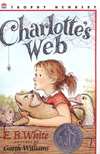
Charlotte's Web
By E.B. White
This was the first novel I ever read by myself. My parents said if I finished it, I could get White's other stories, Stuart Little and The Trumpet of the Swan. I read them all, but Charlotte's Web is the one that still blows me away. As a kid, I would visit Southend Farm, the home of an old family friend in Connecticut. Charlotte the spider is a lot like this family friend of ours—clever, interesting, really brilliant. Somehow the two got mixed up in my brain—Wilbur's farm, Southend Farm—and the novel became completely real to me. I love how it celebrates creativity and the way Charlotte uses her intelligence to save Wilbur. I liked it so much, I named my daughter, in part, after Charlotte.
By E.B. White
This was the first novel I ever read by myself. My parents said if I finished it, I could get White's other stories, Stuart Little and The Trumpet of the Swan. I read them all, but Charlotte's Web is the one that still blows me away. As a kid, I would visit Southend Farm, the home of an old family friend in Connecticut. Charlotte the spider is a lot like this family friend of ours—clever, interesting, really brilliant. Somehow the two got mixed up in my brain—Wilbur's farm, Southend Farm—and the novel became completely real to me. I love how it celebrates creativity and the way Charlotte uses her intelligence to save Wilbur. I liked it so much, I named my daughter, in part, after Charlotte.




